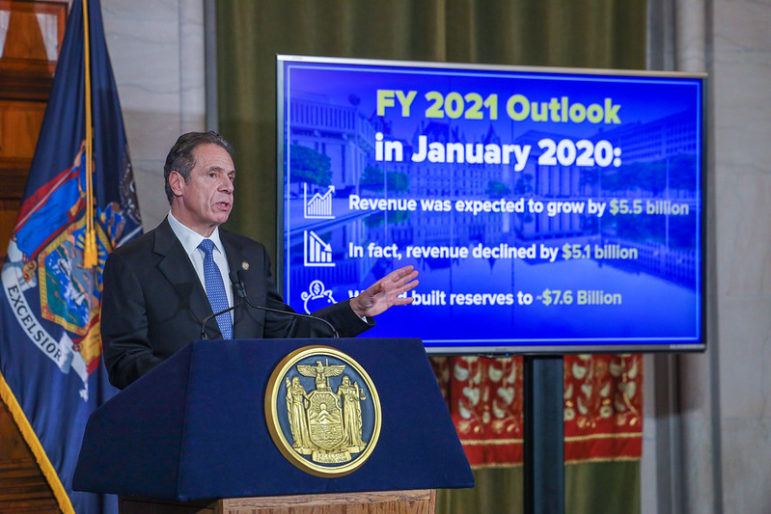Care Coordinated Organizations, which advocate for the needs, desires and rights of people with intellectual and developmental disabilities, are facing a nearly 40 percent cut in the state’s executive budget.

Mike Groll/Office of Governor Andrew M. Cuomo
Gov. Cuomo presents his Fiscal Year 2022 Executive Budget in Albany in January.I am the proud parent of a 37 year-old-man with autism and intellectual disability (I/DD), and to put it bluntly, the state is leaving our community to fend for ourselves. Time and time again, the Office for People with Developmental Disabilities (OPWDD) has failed to plan, manage or fund proper care for New Yorkers with I/DD, however, now they are gutting care coordination programs by nearly 40 percent in the middle of the worst modern pandemic we have ever seen.
This is personal for me. As we all struggle to get through each day safely and in isolation, people with I/DD suffer at a disproportionately higher rate of COVID infections and deaths. They also suffer regression of skills and increased anxious behavior, disruption of essential programs, as well as worsened lingering physical effects of illness. How can New York be turning its back on these vulnerable people precisely when they are most in need of support?
With a growing trend toward lack of transparency when it comes to COVID-19, the state is shirking responsibility by secretly slashing Care Coordination Organizations (CCOs), eliminating funds for supports like round-the-clock care, medical assistance, transportation, group homes and other critical services. For years, OPWDD has done the bare minimum, or less, not keeping pace with needed funding, skipping their 2-year mandated residential surveys, and they have not submitted a strategic plan for residential services or other Medicaid funded services as required by law. This lack of transparency is especially appalling, given the high stake consequences for millions of vulnerable New Yorkers, whether they reside in nursing homes, prisons, or hospital stay, their care has proven to be mismanaged.
CCOs are a literal lifeline for people that have I/DD, like my son. With the mandate of conflict-free care management, the CCOs are the sole institutional bodies that advocate for the needs, desires and rights of people with I/DD intervening with both providers and OPWDD when needed. Their mission is to protect the health and safety and quality of life of our loved ones. It is precisely in this period of public health challenges and fiscal instability, that we desperately need these organizations to support people with I/DD. It is truly unconscionable to decimate them now.
We have a system in crisis and chaos, unprepared to meet the challenges of today, and the promise of a future for our loved ones. As families, we need transparency. We need care. We need to know New York will fight for all of its people, not just a select few. We ask that the State stop the proposed funding cuts to the CCOs and overall I/DD, sector to prepare for the enhanced service needs required for pandemic recovery and the full range of residential and rehabilitation services. People with I/DD, their families, the providers and CCO’s that support them deserve no less. My son, and your loved ones, deserve no less.
Rachelle Kivanoski is the Manhattan Regional Chair of the Care Design NY Individual & Family Advisory Board.
The state’s Office for People with Developmental Disabilities responded with the following statement: Ensuring the delivery of needed services for people with developmental disabilities continues to be OPWDD’s top priority. The pandemic has devastated state revenues, requiring a close look at all spending decisions. This proposal, which is in the state financial plan, aligns reimbursements with the costs of operating these programs and will have no impact on the services they provide to New Yorkers. It also incentivizes providers to enroll program participants in Medicare, where applicable, to reduce costs over the long-term. Despite the global pandemic and lack of federal funding, the Executive Budget calls for a 2.8 percent increase in state spending on OPWDD programs.
Editor’s Note: Due to an editing error, this post initially ran with an incorrect version of this op-ed. The post has been updated.








4 thoughts on “Opinion: Proposed State Budget Cuts Would Dismantle Care for New Yorkers with Disabilities”
I am the single parent and guardian of my adult, vaccine damaged, son who is now 36 years old. He has multiple disabilities and is ID/DD. Due to the pandemic his jobs: owner of his own cleaning business and employee at a local restaurant have dried up. He is now home like so many other individuals. I have retired in order to help care for him because it is impossible to get home care aides in place for him. The cuts to CDPA and other programs are tragic. The lack of a livable wage for these care givers makes it impossible to provide much needed coverage. My son has worked in the community for 20 years and contributed to New York’s tax base just like everyone else who lives and works in this state. New York ALWAYS discriminates against it’s its most needy residents and the disability community is the first on the chopping block year after year. KNOCK IT OFF!
I agree with you 100 per cent. As the single/widowed parent of a special needs son they n.y. got do not think of the disabled community as people. Mario Cuomo cared with his friend Bernadette Castro. However his a one are not like him.my question has always been put yourself in my shoes but it goes to deaf ears. I think we need federal help..any suggestions.
Please the disabled and elderly need to be cared for first and foremost or who are we as a society!!!!?
It is already so difficult and down right impossible at times to receive care, find services that will accept my daughter’s insurance or get help with forms. Our children and love ones deserve better. I work and pay my taxes to ensure that I do my part. Please governor and lawmakers do your part to not decrease funding for our developmentally challenged individuals. They all can’t speak for themselves. Therefore, help us parents that tirelessly advocate for them.